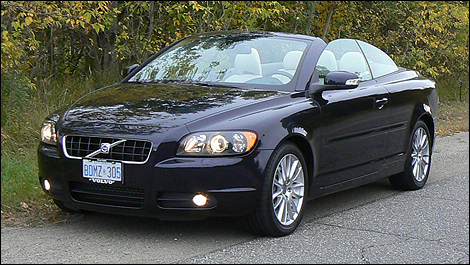Dec. 1 (Bloomberg) — Ford Motor Co. said it may sell its Volvo unit, the company’s sole remaining European brand, a day before the automaker is scheduled to present a survival plan to U.S. lawmakers.
The review of options for Volvo was spurred by the worldwide auto decline and probably will take several months, Ford said today in a statement. Shedding the Swedish unit would complete the unwinding of a two-decade strategy of diversifying by buying European luxury brands. Volvo, acquired in 1999 for $6.4 billion, was retained after a similar evaluation last year.
Related article: Volvo and Saab ask Sweden for aid
Ford, General Motors Corp. and Chrysler LLC are to present plans tomorrow demonstrating why they should get $25 billion in U.S. financial aid and that they can be viable businesses. Volvo was once central to a failed strategy by Dearborn, Michigan-based Ford to reap a third of its profits from luxury autos in 2006.
“All of these businesses are being forced to reveal their hand,” said Maryann Keller, an independent auto analyst and consultant in Greenwich, Connecticut, in an interview. “Ford can put Volvo up for sale, but there aren’t going to be any buyers. It may come down to the Swedish government taking it.”
Sweden’s government said today it won’t provide direct aid to Volvo or GM-owned Saab because European Union rules ban such action. Seven out of 10 Swedes back a temporary government takeover of Gothenburg-based Volvo if Ford can’t secure the unit’s future, the newspaper Dagens Industri reported last week.
‘Severe Economic Instability’
Ford, the second-largest U.S. automaker, said it decided to reevaluate Volvo “in response to the significant decline in the global auto industry particularly in the past three months and the severe economic instability worldwide.”
Ford rose 7 cents, or 2.6 percent, to $2.76 at 11:52 a.m. in New York Stock Exchange composite trading.
The automaker has said it isn’t immediately seeking U.S. aid, while wanting to be able to draw upon such assistance if it runs out of cash. Detroit-based GM, the biggest in the U.S., has said it may run short of funds for its operations this year.
Ford began buying European automakers in 1987, when it purchased a controlling interest in U.K.-based Aston Martin. Ford acquired Jaguar in 1989 and Land Rover in 2000. The U.S. company sold Aston Martin for $931 million in May 2007, and Jaguar and Land Rover in June of this year for $2.4 billion.
India’s Tata Motors Ltd. bought Jaguar and Land Rover for less than the $2.5 billion Ford paid in 1989 for Jaguar alone. The price also didn’t cover investments Ford made in the U.K. brands, including $2.1 billion in 2005 for a revamping of Jaguar.
Mulally’s Plan
The automaker has been shedding European brands under Chief Executive Officer Alan Mulally, recruited from Boeing Co. in 2006. Mulally is integrating regional units and focusing on marketing the company’s namesake brand, under his One Ford plan.
Ford has lost $24 billion since 2005, the last year it had an annual profit. This year’s credit crisis and recession spurred Ford to retreat from a target of returning to profit next year.
“Given the unprecedented external challenges facing Ford and the entire industry, it is prudent for Ford to evaluate options for Volvo as we implement our One Ford plan,” Mulally said in today’s statement.
Volvo’s third-quarter pretax loss widened to $458 million from $167 million a year earlier, as its sales declined 24 percent to $2.9 billion. The unit tripled its planned job cuts to 6,000 in October and said Nov. 8 that it was in talks with Sweden’s government about potential financial support.
In September, Ford named Stephen Odell as Volvo’s CEO, the first non-Swede to head the carmaker.
Declining Sales
Volvos are more expensive to sell in the U.S. because the dollar has weakened against the Swedish krona since 2002. That helped trigger a 24 percent slide in demand from 2004 through 2007, and U.S. sales fell an additional 28 percent this year through October.
Volvo sales in the U.S. peaked at 139,384 cars and sport- utility vehicles in 2004. Last year, they slid to 106,213, more than 10,000 below the total for 1999, when former Ford CEO Jacques Nasser acquired Volvo. The U.S. accounts for 23 percent of Volvo sales.
Volvo has fared better outside the U.S. Global sales totaled 458,323 last year, 14 percent more than 1999. In 2007, Volvo recorded gains in developing markets such as Russia and China and also in nations such as France and the Netherlands.
To contact the reporter on this story: Bill Koenig in Southfield, Michigan, at [email protected]; Mike Ramsey in Southfield, Michigan, at [email protected]
Last Updated: December 1, 2008 11:53 EST
By Bill Koenig and Mike Ramsey
Source: Bloomberg
